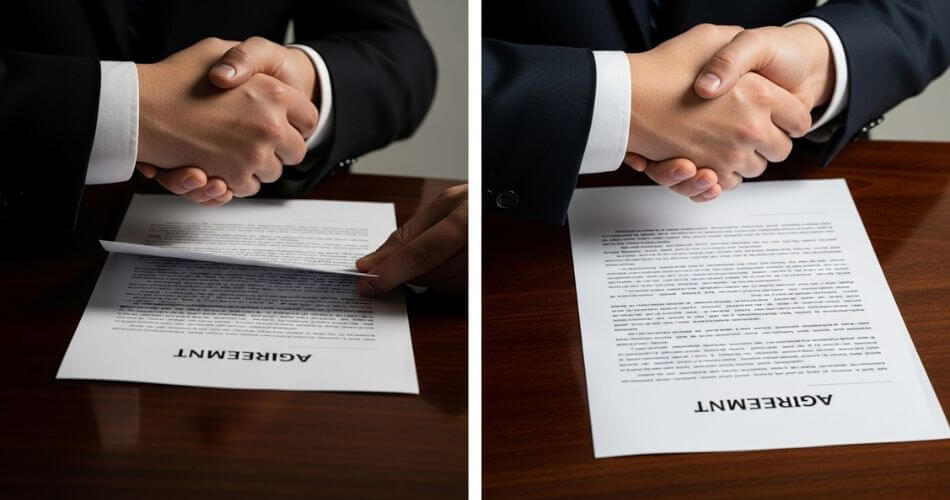how to run a business according to the bible
The Biblical Litmus Test for Christian Entrepreneurs
A hard-hitting guide to closing the gap between your Sunday faith and your Monday grind.

If you are asking how to run a business according to the bible, this article is written for you.
You are likely a Christian business owner who has felt the tension between public profession of faith and private commercial practice.
This piece sets out four tests that expose common failures and name the difficult, costly choices that faithful business life requires. It is neither a sermon nor a pep talk.
It is a direct, scripture-rooted briefing on what integrity looks like in day-to-day commerce.
This briefing uses concrete examples of failure that have become routine in real estate: promises without follow-through, putting commission above compassion, and selective honesty.
It then outlines a clear account of what stewardship in business requires, what bearing true witness looks like in practice, why faith and work integration matters, and where courage to lose becomes a business necessity.
Read as friends: we hold you to a high standard because the stakes are the souls and finances of real people you serve.
The First Test: Are You a Steward or Just an Owner?

Stewardship reframed as vocation.
The Parable of the Talents shifts our frame from ownership to stewardship. In practice, stewardship in business means recognising three elements:
- Someone you are responsible to.
- Something you are steward of.
- And those you are responsible for.
Scripture teaches that management of a resource is not private property exercised for personal advantage, but entrusted responsibility exercised for another.
When agents behave as owners first, the temptation to cut corners and prioritise commission over client welfare becomes predictable.
Practical markers of stewardship in business.
Stewardship in business shows itself in decisions that protect the client’s long-term interest.
This shows up in choices such as refusing mandates that require deception, taking time with elderly clients who do not understand contracts, and avoiding pressure sales techniques.
These are not sentimental gestures. They are operational standards that translate biblical accountability into the daily rhythms of appointments, paperwork, and client contact.
Operational consequences of stewardship or the lack of it.
When stewardship governs behaviour, a business builds reputation and sustainable trust. When ownership logic governs, short-term gain erodes relationships and creates moral debt.
Stewardship produces measurable advantages: long-term relationships, lower reputational risk, and a business identity that aligns with Christian business principles.
Choosing stewardship means reconfiguring metrics of success to include faithfulness to clients as a primary KPI. (Key performance indicator)
The Second Test: Are You Bearing True Witness or Just Closing a Deal?

The sin of omission as a business failure.
James 4:17 is the theological hinge: knowing the right thing to do and failing to do it is sin. In commercial terms, this includes not returning calls, missing appointments, and disappearing after securing mandates.
Theologically, these failures are considered “sins of omission,” positioning them not as mere sloppiness but as spiritual unfaithfulness. Bearing true witness requires active truth-telling and care for those who depend on us.
Bearing true witness in transactions.
Business ethics from a biblical perspective requires full disclosure, honest valuation, and open communication.
Selective honesty, where defects are downplayed and demands exaggerated, violates both the duty to clients and the mandate to bear witness.
Modern marketing’s transparency obligation deepens this requirement: buyers complete much of their decision-making before they speak to an agent, so silence or spin has real consequences.
Concrete practices to restore truth-telling.
To correct the omission, implement accountability for basic courtesies: return every client call in 24 hours, document appointments, and require full disclosure of material facts on the listing brief.
These operational steps map the biblical bearing of witness to the business process. Restoring trust is not a single act but a pattern of consistent short actions that demonstrate integrity and respect for the person behind the transaction.
The Third Test: Are You Integrated or Compartmentalized?

The problem of compartmentalisation.
Compartmentalisation is a profound spiritual and psychological danger.
Drawing on Bonhoeffer and Christian psychology, it becomes clear that treating faith as a separate domain produces double-mindedness that corrodes relationships, mental health, and public witness.
Agents who “sprinkle in” faith on Sundays but act differently in the office create cognitive dissonance that surfaces in anxiety, relational strain, and diminished moral clarity.
Integration as spiritual formation and business discipline.
Faith and work integration requires structures that hold behaviour to the same standard across contexts.
Practical accountability, transparent reporting, and peer review of difficult decisions are systems that bridge faith and practice.
An integrated personality structure, rather than fragmentation, preserves both spiritual health and business effectiveness. In other words, integration is both a pastoral and an operational intervention.
Actions that build integration.
Begin by naming decision rules that reflect Christian business principles. Use those rules in listing briefings, client counselling, and pricing calls.
Build small accountability circles among colleagues where challenging cases are discussed and judged against scriptural standards.
Integration also means refusing quick fixes that look profitable but compromise character. These are costly moves initially, but they stop the slow erosion of soul and reputation that compartmentalisation causes.
The Final Test: Do You Have the Courage to “Lose”?

The theology and practice of losing.
This test is rooted in the Parable of the Talents and the sowing and reaping principle of Galatians 6. The pattern is clear:
Investing in people rather than extracting every possible gain creates durable networks of trust.
Proverbs contrasts deceptive wages with the sure reward for righteousness. The theological argument is not abstract; it shows in stronger, healthier commercial relationships that deliver longer-term yield.
Sabbath and the economy of rest.
Sabbath principles challenge the relentless hustle culture that prizes immediate commission. Rest is not mere leisure; it is trust in providence and a boundary that prevents exploitation.
Practically, observing rhythms that protect client care, refusing to join pressure cycles, and setting honest expectations with clients rebukes the short-term logic of “close at any cost.”
Concrete business outcomes of courageous integrity.
Companies that operate with radical honesty often enjoy lower overheads and stronger partnerships.
Choosing to forgo an opportunistic sale can preserve reputation and open future profitable opportunities that a rapid, dishonest transaction would foreclose.
The call here is hard: build a practice where your default answer is to protect the client, even if that means shorter commissions now, because the harvest of trust is real and lasting.
The four tests are a practical checklist for anyone asking how to run a business according to the bible. Be a steward, not merely an owner.
Bear true witness and refuse the sins of omission. Integrate faith into daily practice so you are not double-minded. Finally, have the courage to lose short-term gain to preserve long-term trust.
These are not optional moral extras. They are business decisions that shape reputation, referrals, and the long-term viability of your work. The real question you must answer now is this:
Will you choose people over profit?
About the Author
Andre Swart is a respected leader in Brackenfell real estate with over 20 years of results-driven experience. Through his platform, “Andre Swart Inspires,” he moves beyond simple property sales to share the proven mindset, strategies, and habits that build lasting success.
Grounded in integrity, Andre’s mission is to mentor the next generation of top agents and provide homeowners with the trusted guidance they deserve.
